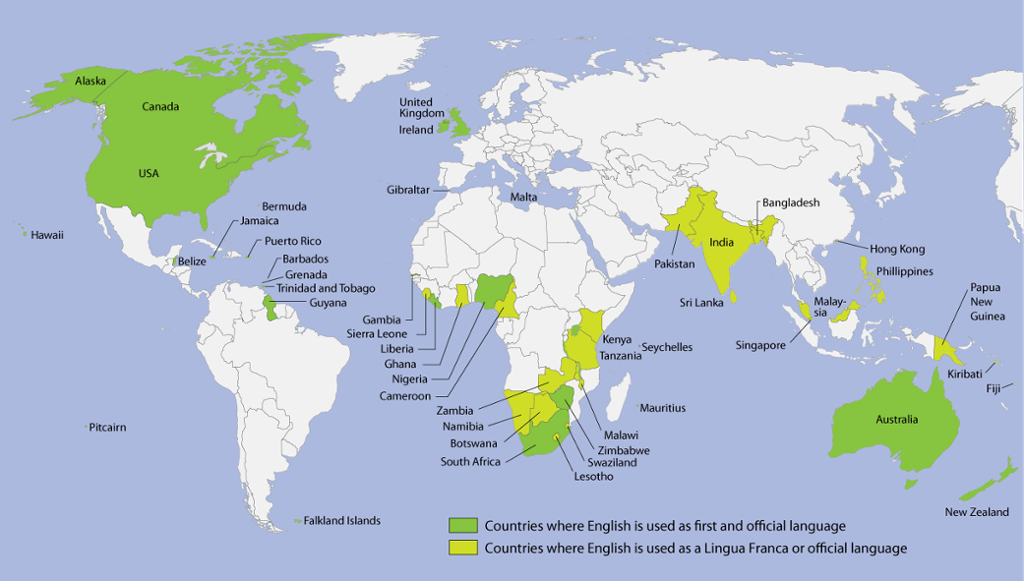
The British Empire at its peak included more than 25 per cent of the world's land mass and a quarter of its population. During the first half of the 20th century the Empire was gradually dismantled, and colony after colony achieved the status of an independent state.
British sovereignty had in some of the colonies lasted for centuries and had in many ways defined the country’s culture and society. This was seen particularly in countries where the native populations were subdued and had to adjust to British culture and lifestyle, for example in New Zealand and Australia.
The new liberty and independence were of course welcomed by the inhabitants of the colonies, but it proved to be a demanding task for the colonies to establish a culture and national identity of their own. The British had left behind a legacy which is still evident in many of these countries.
Language
Primarily due to British colonisation, the English language has achieved a status as world language number one. 400 million people in nine countries have English as their mother tongue, while another 30 countries use English as an official second language.
English has become the lingua franca all over the world, in fact, a basic knowledge of English is compulsory to get by in most fields of human activity today; travelling, international business, aviation, diplomacy, education, technology, marketing and so on.
For cultural understanding and international communication it is important that people can speak the same language. English colonisation and American cultural influence have provided a common world language. However, some smaller countries see this Anglo-American impact as a threat and have taken measures to protect their own language and national identity.
Education
Most of the people in the colonies were illiterate when the British took over. So the English took up “the white man’s burden” to enlighten and teach the native population of these countries. The English ruling class founded schools and educational systems that would support their own status and sovereignty, like in India where a group of native Indians were educated as officials to serve the British Empire as intermediaries between the British and the Indians.
When India declared its independence in 1947, there was a debate about which educational system the nation should follow. The alternatives were the traditional system based on English principles and the system introduced by Mahatma Gandhi (nai taleem) which focuses on an education in which both practice and theory are incorporated. Today education in India is primarily based on Gandhi’s method.
In other former British colonies, like Australia and New Zealand we see school systems and educational principles that are very much influenced by English standards. There is a state school system, but many children go to private schools, mostly run by religious groups. In many schools the English tradition of school uniforms is still maintained.
Politics and Religion
With decolonisation the most difficult challenge was establishing a democratic political system. These countries had no tradition for democracy or self-rule, and the result was strife and conflict between different power-seeking groups. In many cases the situation became quite chaotic and even led to civil war.
In Africa the borders between the countries had been randomly drawn by the colonists without considering tribes and ethnic identity. When the colonists left, tribal wars broke out in many areas and in the turmoil militant groupings took the opportunity to seize power. Some of the new countries ended up as totalitarian regimes of terror and oppression.
Religion was also a significant element in the establishment of a new state. In India the transformation from a British colony to an independent state would mark the map of Asia for the future. Gandhi lived to see the end of English rule, but he also saw his country divided into an Islamic Pakistan and a predominantly Hindu India.
Culture and Society
British traditions and customs are still maintained in many of the former colonies. Australia and New Zealand were mainly settled by British emigrants, and they brought with them their own customs and values. The flags of the two nations bear witness of the fact that they formally still have the English monarch as their sovereign.
If you check the list of the some seventy countries in the world where they drive on the left, most of them are former British colonies. Among them you will find countries like India, Australia, and New Zealand, along with many countries in the Caribbean. European countries that have left-hand driving include Malta and Cyprus in addition to Great Britain and Ireland.
Most of the former colonies of the British Empire have joined the Commonwealth of Nations, which initially was called the British Commonwealth. It is a loose association of 54 independent states formed to encourage international understanding and cooperation in fields like culture, trade, and sport. The Commonwealth Games are an even bigger event than the Olympic Games. Ireland is one of the former colonies that is not a member of the Commonwealth.
When the Empire was dissolved Britain opened its doors for a massive immigration from the former colonies. They came for education and work, but also to meet the British need for a workforce to rebuild the country after the Second World War. Some of these immigrants returned to their home countries, but most of them stayed and became the start of what we today see as multicultural Britain.